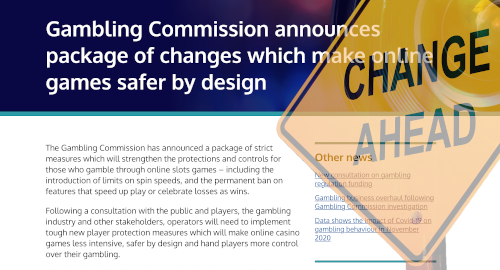
UK online gambling operators have been given new rules for their online slots offering that will likely take a big bite out of their online casino revenue.
On Tuesday, the UK Gambling Commission (UKGC) announced a raft of changes intended to make certain online games “safer by design.” The changes follow a consultation launched last July that sought stakeholder and public input into how to ensure greater protections for vulnerable gamblers.
Most of the changes involve online slots but the UKGC is also permanently codifying the prohibition on ‘reverse withdrawal functionality’ that was imposed as a precautionary measure last May as the UK went into its first pandemic lockdown.
The existing prohibition on reverse withdrawals will persist until October 31, 2021, the date by which the new rule will officially take effect. Operators must also strive to make the withdrawal process “as frictionless as possible.”
As for the slots changes, most of them were telegraphed well in advance following the UKGC’s consultations with its ‘working groups,’ particularly the one consisting of game developers Playtech and Scientific Games Corporation and the ‘Experts by Experience,’ consumers who’ve suffered personal harm from gambling.
Numerous aspects of online slots play will now be banned as of October 31, including allowing auto-play functionality, for which the UKGC found “a correlation with issues around intensity of play” in “a sizeable minority” of players who made use of auto-play. The aim is to ensure that players must “commit to each game cycle individually.”
Similarly, operators must impose measures to ensure players can only access one slots game at a time, eliminating split-screen or multi-screen functionality. The UKGC isn’t yet requiring operators to ensure players can’t engage in multiple games simultaneously across multiple browsers/devices, but vowed to address this issue in future through its Single Customer View project.
Slots titles will also need to introduce a minimum 2.5-second spin speed, which is already present on land-based gaming machines in UK betting shops. The UKGC stresses that it’s not claiming that such a duration is either ‘safe’ or ‘unsafe,’ merely a means by which it can conduct further research on both land-based and online slots to determine potential future regulatory adjustments.
So-called ‘spin stop’ features – in which a player’s actions force a halt to the spinning reels – will be prohibited due to the UKGC’s view that they give consumers “the illusion of control” and “the erroneous impression that their interaction influenced the outcome.” Players can still opt to skip game animation provided the 2.5-second interval between game cycles is maintained.
Also on the chopping block are game sounds and displays that suggest a ‘true win’ despite the player seeing a return less than or equal to their original stake. These “celebratory effects” may induce “a hot state” that could lead players to suffer additional gambling harm.
Many operators protested that the changes required to existing games were extensive and couldn’t be met by the October 31 deadline. The UKGC rejected this view and will require operators to withdraw any games that can’t be modified by the deadline.
Operators will be required to display a player’s net financial position in each gaming session as well as the time spent engaged in an individual session. The UKGC rejected some operators’ suggestion that there was no room for this info on smaller digital devices.
The UKGC intends to monitor the impact of the above changes to gain a better understanding of how consumers respond. Among the areas of focus will be the number of sessions that last over 60 minutes, sessions that result in significant player losses and any changes in staking patterns.
The Betting and Gaming Council (BGC) industry lobby group issued a statement welcoming the UKGC report, noting that operators had already implemented many of the proposed changes. However, the BGC reiterated its suggestion that too great a regulatory crackdown will only encourage punters to seek out unauthorized online options.
The new game design rules are but one plank of the UKGC’s ongoing regulatory revamp, including studying how and when operators intervene in suspected cases of problematic play and the likely imposition of affordability checks on customers. The consumer protection effort comes as the UK government conducts its overdue review of the Gambling Act 2005.





